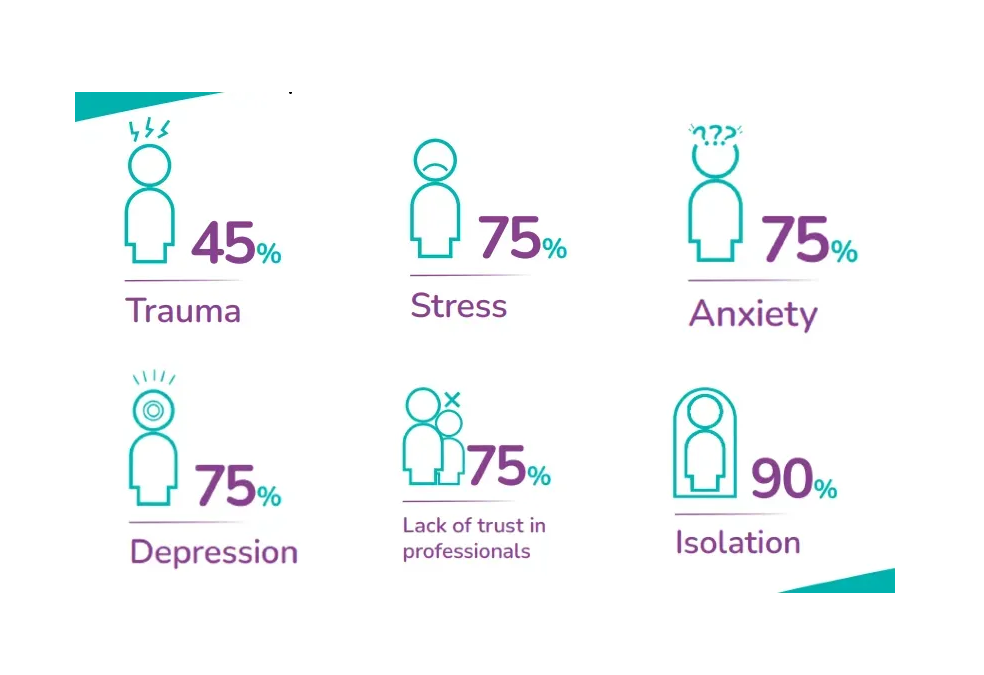The Negative Impact of Delayed Hospital Discharges
After a prolonged hospital stay, some people may need nursing care, in-home therapy solutions or additional support. However, many people face delays in receiving these services due to transitions between different stages of care. These delays negatively impact health outcomes, leading to slower recovery times and a reduced quality of life. Furthermore, they place significant pressure on hospitals and the entire healthcare system, which must cover the costs of extended care and hospital stays without sufficient reimbursement.
However, discussing delayed hospital discharge is impossible without first putting a spotlight on hospital admissions. We conducted a survey to gather insights from commissioners, families, and support workers about the challenges in the UK health and social care system to understand the reasons for hospital admissions and create effective discharge plans. This survey was our motivation for making our first White Paper, which is full of relevant data and statistics regarding the challenges of the health and social care system.
What we found was quite concerning. The data shows that over 62% of the respondents reported not being given proper and accurate information about the reasons for their prolonged hospital stay. Most people were not even given a suitable discharge plan due to a lack of communication, which raises even more questions about the transparency of the care system. The results highlight the urgent need to make serious improvements in discharge planning to ensure people get the correct information at the right time.

These challenges negatively impact not only people’s mental and physical health but also care professionals and support workers who are on the frontline of delivering care and support.
What Are Some Of The Health Risks Associated with Prolonged Hospital Stays?
Among hospitals in the UK, a big crisis is unfolding as people unnecessarily stay in hospitals for extended periods and are unknowingly exposed to various health risks. These risks can affect anyone, from children to older adults. Some of the most significant health concerns related to prolonged hospital stays include the following:
- Sleep deprivation
- Healthcare-associated infections (HCAIs)
- Increased poor outcomes
- Mental and physical deconditioning (affecting mobility, strength, and cognitive awareness)
- Increased mortality
- Disruption of patient flow and access to care
These concerns remain a pressing challenge that demands our attention. Data from the NHS suggests more than 350,000 people who receive care stay in hospital for over three weeks. What more can be done to increase efficiency and avoid these risks to ensure people’s health and safety?
Emotional Toll on Patients and Families
Based on the information gathered from the responses in our White Paper, care recipients shared several common concerns about the negative impact of delayed discharge, especially on their mental health:
- 45 % experienced trauma
- 75% felt stressed, anxious and depressed
- 75% experienced a lack of trust in care professionals
- 90% experienced isolation

Care recipients also reported the lack of communication, quality of care, and community provision were the most significant obstacles they faced when experiencing delayed hospital discharge.
Another challenge of delayed hospital discharge was the overwhelming emotional toll that extends to families, as well as the development of feelings of isolation and abandonment. Hospital discharge delays result in families experiencing increased anxiety, social isolation and worry, which are all factors that impact well-being and overall mental health.
Factors Contributing to Delayed Hospital Discharges
Hospital discharges are a highly anticipated moment. For many people, it signifies the transition from a hospital setting to continuous care in people’s own homes or other alternative care settings. So, when a discharge is delayed, it can create an adverse effect and cause challenges that negatively impact people’s lives, the lives of their families, and the broader healthcare system.
The causes of delayed hospital discharges are multifaceted, ranging from internal hospital processes to person-related challenges with broader systemic limitations. Some of the key factors include:
- Factors Related to Hospital Capacity and Processes: One of the leading causes of delayed discharge comes from complex hospital processes, such as prolonged testing time and delays in the release of the test results. These issues must be urgently addressed through interventions by the care team or management. Additionally, high hospital bed occupancy plays a role in delayed hospital discharge.
- Factors at the Systemic Level: The entire structure of the healthcare system contributes to late discharges, including long waiting lists, especially in long-term care facilities and comprehensive community services, as well as issues related to hospital funding.
Our White Paper explored the experiences care recipients faced with delayed discharges, and the data showed that 66% of people found hospital settings unsupportive, 22% felt neutral, and only 11% had a positive experience.
The Role of Home Community Services
Transitioning from hospital to home or community is essential to improved health outcomes. Without proper support and management, it can lead to unnecessary and prolonged hospital stays, burdening healthcare resources and causing setbacks in people’s recovery. Care at home and community support are crucial services that enhance people’s quality of life, helping people live in a familiar and comfortable environment surrounded by people they love.
Local authorities and families consistently seek care providers who offer person-centred support with a holistic approach to ensure a smooth transition to home settings and minimise hospital stays. This is precisely what Unique Community Services can provide.

We understand the positive impact of person-centred, holistic support and how it fosters a sense of independence and dignity. By offering compassionate care in people’s homes, we help people maintain their daily routines and engage with their families and communities.
Learn more about collaboration between health and social care providers and local authorities.
Strategies to Address Delayed Hospital Discharges
Delayed hospital discharges are a significant challenge that is a major contributing factor to compromised care. However, effective strategies can be utilised to reduce discharge delays.
Some of the strategies include:
- Early Planning: Discharge planning should begin at the very start of care, during the admission stage, as it enhances collaboration and helps foster empowerment.
- Home and Community Services: Home care and community services are essential for creating a smooth transition from hospital to home, ensuring that people receive holistic care and support in the comfort of their own homes.
- Rapid Response Services: Rapid response services can help in the discharge process by delivering high-quality care at home, which reduces the length of hospital stay.
- Comprehensive Rehabilitation Services: Offering home-based therapy and comprehensive rehabilitation support can prevent hospital readmission, including physical therapy, occupational therapy, and other therapeutic interventions.
Reducing Delayed Hospital Discharges with Unique Community Services
Unique Community Services is dedicated to reducing delayed discharge by providing proactive and preventive support. Our approach focuses on delivering holistic and immediate care in the comfort of people’s own homes, ensuring a smooth transition from hospital to home.
Additionally, our dedicated in-house therapy team includes experienced and skilled therapists who collaborate to offer Positive Behaviour Support, Occupational Therapy, and Speech and Language Therapy.
Our therapy team can help facilitate smooth transitions by meeting people’s unique needs and fostering their strengths. We believe that home and community settings are the best places for recovery, and our services are developed to ensure that people recover in a familiar and comfortable environment.
Where you can find us: Manchester and Leeds .

